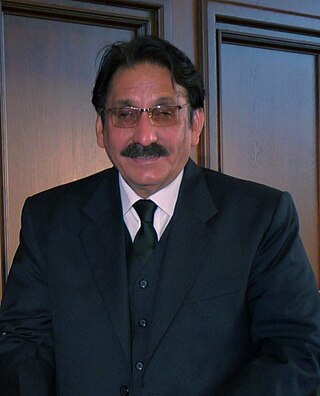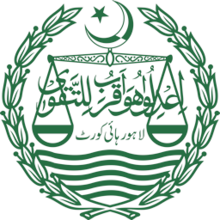Related Research Articles

The Supreme Court of Pakistan is the apex court in the judicial hierarchy of the Islamic Republic of Pakistan.

Nazim Hussain Siddiqui a Pakistani jurist who served as Chief Justice of the Supreme Court of Pakistan,from 31 December 2003 to 29 June 2005.

Iftikhar Muhammad Chaudhry is a Pakistani jurist who served as the 20th Chief Justice of Pakistan over three non-consecutive terms from 29 June 2005 to 11 December 2013.

The Lahore High Court is a provincial court house based in Lahore,Punjab,Pakistan. It was established as a high court on 21 March 1882. The Lahore High Court has jurisdiction over the province of Punjab. The High Court's principal seat is in Lahore,but there are benches in three other cities of the province:Rawalpindi,Multan and Bahawalpur.

A state of emergency was declared by President of Pakistan Pervez Musharraf on 3 November 2007 which lasted until 15 December 2007,during which the Constitution of Pakistan was suspended. When the state of emergency was declared,Musharraf controversially held both positions of President and Chief of Army Staff. He later resigned as army chief 25 days into the emergency on 28 November. The state of emergency and its responses are generally attributed to the controversies surrounding the re-election of Musharraf during the presidential election on 6 October 2007,including his holding of both offices of President and Chief of Army Staff at the time.

Abdul Hameed Dogar is a Pakistani jurist who served as the former Justice of Sindh High Court,before being appointed Chief Justice of Pakistan by President Pervez Musharraf,after he dismissed the superior judiciary and declared emergency rule in 2007.

Sardar Muhammad Aslam was a Pakistani jurist,lawyer,and member justice of the Lahore High Court. He was also a justice of the Supreme Court of Pakistan and a former chief justice of the Islamabad High Court. However,as result of Constitution Petition No. 09 of 2009 and Constitution Petition No. 08 of 2009 in the Supreme Court of Pakistan,on 31 July 2009,the court held his elevation to Supreme Court as unconstitutional,void ab initio and of no legal effect. In addition in the same decision,the institution of Islamabad High Court was held as unconstitutional and of no legal effect.

The Lawyers' Movement,also known as the Movement for the Restoration of Judiciary or the Black Coat Protests,was the popular mass protest movement initiated by the lawyers of Pakistan in response to the former president and army chief Pervez Musharraf's actions of 9 March 2007 when he unconstitutionally suspended Iftikhar Muhammad Chaudhry as the chief justice of Pakistan's Supreme Court. Following the suspension of the chief justice,the Supreme Court Bar Association (SCBA) declared the judge's removal as an "assault on the independence of judiciary" and was backed by several political parties.

Sardar Muhammad Raza was Chief Election Commissioner from 6 December 2014 to 5 December 2019. who previously served as retired judge of the Supreme Court of Pakistan and as Chief Justice of the Peshawar High Court. Khan was born in the Namli Maira village in the district of Abbottabad on 10 February 1945.

Tassaduq Hussain Jillani is a Pakistani judge who served as the 21st Chief Justice of Pakistan from 2013 to 2014. He previously served as a justice of the Supreme Court of Pakistan from 2004,after being nominated as a justice of the Lahore High Court by Prime Minister Benazir Bhutto in 1994.

The Provisional Constitutional Order Judges case,refers to cases heard and decided by the Pakistan Supreme Court pertaining to the High Court and Supreme Court judges who took their oath of offices under the Provisional Constitutional Order in 2007. On 3 November 2007,then-President Pervez Musharraf declared a Provisional Constitutional Order,which declared a state of emergency and suspends the Constitution of Pakistan. Under this emergency law,all High court judges,including the Supreme Court justices,were asked to take oath under this Provisional Constitutional Order. Those who didn't were placed under effective house arrest. A seven-member bench issued a restraining order on the same day,barring the government from implementing emergency rule and urging other government officials to not help do so.

The History of the Supreme Court of Pakistan,organised by the Chief Justice of Pakistan,follows from its constitutional establishment in 1947 till its recent events. The Supreme Court of Pakistan is the highest appellate court of the country and court of last resort—the final arbiter of the law and the Constitution.

Mian Saqib Nisar is a Pakistani jurist who served as the 25th Chief Justice of Pakistan from 31 December 2016 till 17 January 2019. He has previously served as the Law Secretary. He also served as a visiting professor of law at the University of the Punjab,where he provided instructions on constitutional law.

Asif Saeed Khan Khosa is a Pakistani jurist who served as the 26th Chief Justice of Pakistan from 18 January 2019 to 20 December 2019. He joined the Supreme Court as a judge on 18 February 2010 and prior to that served as judge of the Lahore High Court.

The Panama Papers case,or the Panamagate case,was a 2017 landmark decision by the Supreme Court of Pakistan that disqualified Nawaz Sharif,the prime minister of Pakistan,from holding public office for life.
Umar Ata Bandial is a Pakistani jurist who served as the 28th Chief Justice of Pakistan from February 2022 to September 2023. He was appointed as the Chief Justice after the approval by President Arif Alvi on 13 January 2022,after which he assumed his office on 2 February 2022 and retired on 16 September 2023.
Sayyed Muhammad Mazahar Ali Akbar Naqvi is a removed Justice of the Supreme Court of Pakistan,he assumed office on 16 March 2020 and was removed as a Judge on 10 January 2024. Naqvi previously served as a Judge of the Lahore High Court before his out of turn elevation to the Supreme Court.
The Broadsheet case,officially known as the "Broadsheet vs Islamic Republic of Pakistan and NAB" case,is an ongoing legal case related to the non-payment of service fees to asset recovery company 'Broadsheet LLC' by the Government of Pakistan.
Manzoor Ahmad Malik is a retired Pakistani judge. He became a judge of the Lahore High Court in September 2009 and was appointed the 43rd Chief Justice of the Lahore High Court on 30th of March 2015. Justice (R) Malik was elevated to the judge of Supreme Court in November 2015.

Irfan Qadir is a Pakistani lawyer and jurist who served as the Special Assistant to the Prime Minister on Accountability and Interior from September 2022 to August 2023. He also served as the 29th Attorney-General for Pakistan from April 2012 to June 2013,and was a Justice of the Lahore High Court in 2009.
References
- 1 2 "Justice Azmat Saeed takes oath as permanent SC judge". www.geo.tv.
- ↑ Desk, Web (July 30, 2019). "Justice Sheikh Azmat Saeed takes oath as acting CJP". ARY NEWS.
- 1 2 "Retired Justice Azmat Saeed to head govt's probe into Broadsheet LLC scandal". www.geo.tv.
- ↑ "LHC dismisses contempt petition against Maryam Nawaz". March 6, 2023.
- ↑ "Ex-SC judge Azmat Saeed out from IPPs' case". The Express Tribune. June 20, 2022.
- ↑ today, Asia (August 26, 2019). "SC Judge Justice Azmat Saeed to retire today".
- 1 2 "'No shortcuts in path of justice,' says Justice Azmat in farewell speech". August 27, 2019.